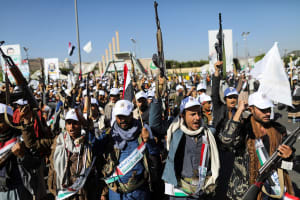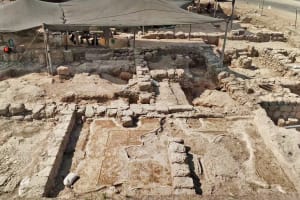Did Israel kill 'the entire gov't of Yemen' last month? Understanding the nature of the 'Houthi government'
Houthi terrorists violently took power during violent insurgency vs recognized government

Did Israel get away with “killing the entire government of Yemen” on Aug. 28?
This is the line numerous anti-Israeli activists and “journalists” on social media have taken after Israel eliminated the Houthi prime minister and several other cabinet members in an airstrike.
Israel has been losing the global public opinion war lately and while one could be very tempted to ignore the crowd of rabid Israel haters stalking the internet, some of them are reaching millions of followers with their false information.
Looking at some of the worst offenders and their claims, there is Cenk Uygur, with 765,000 followers, the host of the far-left The Young Turks news show (with 6.2 million subscribers).
He wrote on 𝕏: “Israel just murdered Prime Minister of Yemen and their entire cabinet. If anyone had done this to Israeli Prime Minister and Cabinet, they'd be considered by Western media as the worst terrorists in the world. So, what does that make Israel? They're obviously a terrorist state.”
Mehdi Hasan, a Qatar-linked British-American journalist and columnist at the Guardian, with 1.7 million followers on 𝕏, wrote: “Israel apparently can wipe out entire governments of Middle Eastern countries.”
In another post, Hasan said Israel wiped “out the entire civilian leadership of the de facto government of Yemen.”
Abby Martin, a far-left journalist with almost 596,000 followers, and one of the most frequent guests talking about Israel on the most popular podcast on earth, "The Joe Rogan Experience," also weighed in.
“Israel can murder the PRIME MINISTER of Yemen with zero consequences? If Yemen killed Netanyahu, nukes would already be flying,” she wrote.
So, did Israel in fact “kill the entire government” of a sovereign nation? Even if it did, it wouldn’t necessarily be a war crime, for example, when two nations are at war.
However, in this case, the slain so-called cabinet ministers, including the “Prime Minister of Yemen” Ahmed al-Rahawi, are anything but well-meaning, civilian, democratically elected officials.
Rather, they are part of a murderous, internationally recognized terror organization, the Houthis – while the internationally recognized government of Yemen, which they violently displaced, had to flee to the southern Yemeni city of Aden.
To understand the highly complex state of governance in Yemen today, one must look at the decade of civil war that ravaged the country.
The terror organization known as the Houthis – or as they call themselves, Ansar Allah (God’s helpers) – emerged in the 1990s, centered around the al-Houthi family and its allied clans in the northern part of the country.
The family and most of its followers are part of the Zaydi (also known as “Fiver”) variety of Shia Islam. However, the Houthis promote an idiosyncratic, vague and politicized ideological program, which is largely based on the teachings of its founder, Hussein al-Houthi, rather than traditional Zaydi teachings.
It quickly became infamous for its virulent anti-American and anti-Semitic rhetoric, including its official motto: “God is great! Death to America! Death to Israel! Curse upon the Jews! Victory to Islam!”
Hussein al-Houthi was the leader who launched the first insurgency against the government of Yemen in 2004, when it was ruled by Ali Abdullah Saleh.
Saleh, a former military officer and strongman, had taken over the presidency of North Yemen in 1978, and upon the unification with the southern part of the country, became its president in 1990.
The first insurgency lasted from 2004 until a ceasefire in 2010, with the Houthi militias defying the regular armies of Yemen and Saudi Arabia.
This first war against the internationally recognized Yemeni government saw Iran and Hezbollah, who are part of a different branch (“Twelver”) of Shia Islam, offer their first support to the group, which, over time, also began emulating the Khomeinist ideology of the Iranian regime and its proxies.
According to the think tank United Against Nuclear Iran, the regime has been providing the Houthis with weapons and training through the IRGC Quds Force at least since 2009.
When a wave of popular rebellions against the old regimes swept through the Arab world in 2011 (the “Arab Spring”), Abdul-Malik al-Houthi, the brother of the group’s founder, declared the terrorists’ support for demonstrations calling on President Saleh to resign.
After massive protests, clashes between demonstrators and security forces, as well as an almost successful assassination attempt, Saleh agreed to step down.
His former deputy, Abdrabbuh Mansour Hadi, won the election for president in 2012, after running unopposed.
At this point, Hadi had become the leader of a government that still had decent relations with the West and served as an important partner in anti-terrorism operations, despite being undemocratic, unfree, and corrupt.
However, the conflict with the Houthis flared up again, and when the Yemeni Civil War broke out in earnest in 2014, the Iranian-trained and equipped terror army managed to capture the capital Sana’a in September of that year, before signing a deal with President Hadi.
But several months later, the Houthis seized the presidential compound and set up a new government, which has run the Houthi-controlled areas to this day under its current moniker, “Government of Change and Construction.”
The terrorist army continued its advance further south, threatening the city of Aden.
This triggered the intervention led by the militaries of Saudi Arabia and the United Arab Emirates in 2015, who stopped the Houthi forces’ advance and bombed the capital, killing thousands and severely damaging the country’s infrastructure, but didn’t succeed in defeating the Houthis.
The horrific war led to widespread starvation and massive outbreaks of epidemics like cholera, and fighting continued intermittently until a shaky ceasefire took hold around 2022.
The Houthis did succeed in taking over and defending the port city of Hodeidah, which has since served as a critical lifeline for weapon supplies, as well as humanitarian aid supplied by the United Nations.
Meanwhile, the government forces failed to beat back the terrorists while having to deal with internal divisions. President Hadi had managed to flee the capital and reemerged to lead the government from Aden before eventually fleeing to Saudi Arabia.
However, in the wake of the civil war, dozens of armed factions had formed and old allegiances returned to importance. When disputes emerged, local forces in Aden, the former capital of Southern Yemen, who were more aligned with the UAE than with Saudi Arabia, formed the Southern Transitional Council (STC), and its forces took over the city in January 2018.
After President Hadi resigned in 2022, the STC rejoined the internationally recognized government. With the absence of a democratically elected president, it transferred the authority of the presidency to the Presidential Leadership Council (PLC).
The PLC now has eight members and is led by Rashad al-Alimi, a former advisor to Hadi. This council, based in Aden, is the internationally recognized government of the Republic of Yemen, which has effectively not existed as a coherent state for over a decade.
Control over the territory of Yemen can be roughly divided into three parts at this point.
The Houthis control the largest part of northwestern Yemen, including the cities of Hodeidah, Sa’adah, and the capital of Sana’a.
These territories are being governed by the “Government of Change and Construction,” which the U.N. called a “clear violation of the Yemeni constitution” and which is only recognized by the Iranian regime, its main supporter.
On the other side, the PLC and several aligned militias control the largest part of the rest of the country, including Aden.
In addition, several areas in the interior of the country are being controlled by Al-Qaeda in the Arabian Peninsula, which played a substantial role in the civil war but hasn’t been mentioned so far due to space constraints.
The so-called civilian government of the Houthis is nothing but the political arm of a vicious terror group.
Even this “political” arm terrorizes its own population to further its attacks on Israel and operates as a full part of the Houthi terror group, led by Abdul-Malik al-Houthi.
According to Arabic news reports, after the American and Israeli waves of airstrikes, the Houthi government resorted to extorting and kidnapping businessmen in the country, as well as stealing Islamic charity funds, in order to finance the reconstruction of the oil and port infrastructure that sustains their military operations.
The terror organization of the Houthis took power in a violent coup against the internationally recognized government of Yemen.
It has since repressed its own population, kidnapped and killed UN personnel, attacked international shipping lanes, and has lobbed missiles at Israel for two years without provocation.
Summing up: Israel certainly did not eliminate the legitimate government of Yemen.

Hanan Lischinsky has a Master’s degree in Middle East & Israel studies from Heidelberg University in Germany, where he spent part of his childhood and youth. He finished High School in Jerusalem and served in the IDF’s Intelligence Corps. Hanan and his wife live near Jerusalem, and he joined ALL ISRAEL NEWS in August 2023.
You might also like to read this:

















